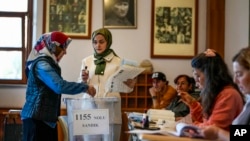Turks voted on Sunday in municipal elections focused on President Tayyip Erdogan's bid to reclaim control of Istanbul from rival Ekrem Imamoglu, who aims to reassert the opposition as a political force after bitter election defeats last year.
Istanbul Mayor Imamoglu dealt Erdogan and his AK Party the biggest electoral blow of two decades in power with his win in the 2019 vote. The president struck back in 2023 by securing reelection and a parliament majority with his nationalist allies.
Sunday's results could now reinforce Erdogan's control of NATO member Turkey, or signal change in the major emerging economy's divided political landscape. An Imamoglu win is seen fueling expectations of him becoming a future national leader.
Engineer Murat Ercan, 60, said he disapproved of Erdogan playing an active role in campaigning for his party ahead of the elections, believing the president should be impartial.
"Ekrem Imamoglu is the sort of president we long for, with his constructive and smiling nature, embracing everyone," Ercan said after casting his ballot in Istanbul.
Polling stations opened at 7 a.m. (0400 GMT) in eastern Turkey and elsewhere at 8 a.m., with more than 61 million people registered to vote. Voting ends at 5 p.m. and initial results are expected by 10 p.m. (1900 GMT).
In Istanbul, a city of 16 million people that drives Turkey's economy, polls suggest a tight race as Imamoglu faces a challenge from AKP candidate Murat Kurum, a former minister.
The results are likely to be shaped in part by economic woes driven by near 70% inflation, and by Kurdish and Islamist voters weighing up the government's performance. Some voters said the ruling party had done enough to prove itself.
"The AK Party has completed very important projects for the development of this country," said Faruk Baran, 28, in the southeastern city of Diyarbakir. "[It] needs to be strong at the local level in order to continue its services."
Kurdish voters key
While the main prize for Erdogan is Istanbul, he also seeks to win back the capital Ankara. Both cities were won by the opposition in 2019 after being under the rule of his AKP and Islamist predecessors for the previous 25 years.
Erdogan's prospects have been helped by the collapse of the opposition alliance that he defeated last year, though Imamoglu still appeals to voters beyond his main opposition Republican People's Party.
Voters of the main pro-Kurdish party were crucial to Imamoglu's 2019 success. Their DEM party this time is fielding its own candidate in Istanbul, but many Kurds are expected to put aside party loyalty and vote for him again.
In the mainly Kurdish southeast, DEM aims to reaffirm its strength after the state replaced pro-Kurdish mayors with state-appointed 'trustees' following previous elections over alleged militant ties.
"I wish for an end to the trustee system. This election is important for Turkey's future and for listening to us: Kurds are always decisive," said civil servant Elif Durgun, 32.
One factor working against Erdogan is a rise in support for the Islamist New Welfare Party due to its hardline stance against Israel over the Gaza conflict and dissatisfaction with the Islamist-rooted AKP's handling of the economy.





